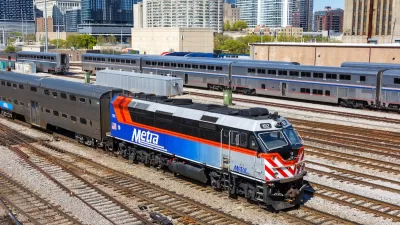A new report suggests that an overreliance on external consultants by U.S. transit agencies and other government entities is hollowing out the public sector and raising the costs of transit projects.

The high cost of building U.S. transit projects has been a hot topic as of late, even as transit services in most American cities remain inadequate. Writing in Slate, Henry Grabar outlines a new report from New York University’s Transit Costs Project that offers recommendations for how to bring down the cost of transit projects, “make it possible for America to build big again,” and rebuild faith in public transit and, perhaps, the public sector in general.
“According to authors Eric Goldwyn, Alon Levy, Elif Ensari, and Marco Chitti, there’s a lot going wrong with American transit projects—more on this in a moment—but many of the problems can be traced to a larger philosophy: outsourcing government expertise to a retainer of consultants.” From New York to California, consultant fees have consumed massive amounts of transit funding. Meanwhile, the report’s authors argue that relying so heavily on external support means agencies don’t hold on to institutional knowledge and skills that could be applied to future projects.
It’s that lack of institutional know-how, of which consultants are both a symptom and a cause, that really hampers projects. The lack of a good in-house team, for example, leads to farming out so-called ‘design-build’ contracts, which ultimately produces more expensive projects by offloading risk to contractors, who bid accordingly.
The report points out that the reliance on consultants isn’t the only factor driving up costs. “Transit routes picked at the ballot box are bound to be worse than those drawn up by experts; transit’s role as a ‘job creation’ bonanza doesn’t create incentives to be particularly efficient.” But the report draws attention to the larger lesson, also laid out in a forthcoming book by Mariana Mazzucato and Rosie Collington: “consultants have hollowed out government functions well beyond transit construction.” Author John Dilulio makes a similar argument, arguing that the shift to contractors “has created a federal apparatus that’s at once bigger, less efficient, and less accountable.”
FULL STORY: Consultants Gone Wild

Planetizen Federal Action Tracker
A weekly monitor of how Trump’s orders and actions are impacting planners and planning in America.

San Francisco's School District Spent $105M To Build Affordable Housing for Teachers — And That's Just the Beginning
SFUSD joins a growing list of school districts using their land holdings to address housing affordability challenges faced by their own employees.

The Tiny, Adorable $7,000 Car Turning Japan Onto EVs
The single seat Mibot charges from a regular plug as quickly as an iPad, and is about half the price of an average EV.

As Trump Phases Out FEMA, Is It Time to Flee the Floodplains?
With less federal funding available for disaster relief efforts, the need to relocate at-risk communities is more urgent than ever.

With Protected Lanes, 460% More People Commute by Bike
For those needing more ammo, more data proving what we already knew is here.

In More Metros Than You’d Think, Suburbs are Now More Expensive Than the City
If you're moving to the burbs to save on square footage, data shows you should think again.
Urban Design for Planners 1: Software Tools
This six-course series explores essential urban design concepts using open source software and equips planners with the tools they need to participate fully in the urban design process.
Planning for Universal Design
Learn the tools for implementing Universal Design in planning regulations.
Smith Gee Studio
City of Charlotte
City of Camden Redevelopment Agency
City of Astoria
Transportation Research & Education Center (TREC) at Portland State University
US High Speed Rail Association
City of Camden Redevelopment Agency
Municipality of Princeton (NJ)





























